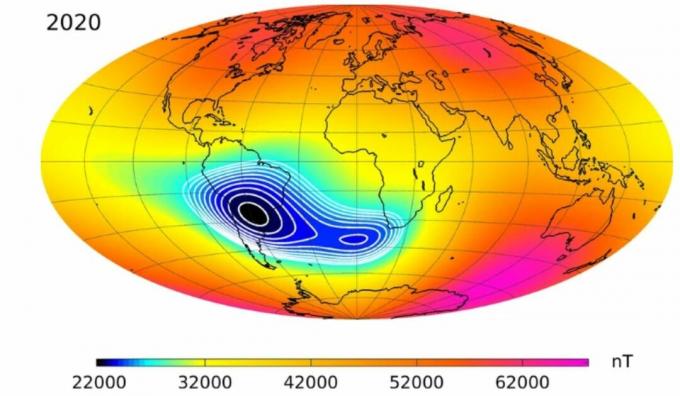
Whenever cosmic anomalies are identified by astronomers, the scientific community is on high alert. Especially when these phenomena are captured and disseminated by the National Aeronautics and Space Administration of the United States, the famous NASA.
Recently, a new disturbance was identified, this time in the Earth's magnetic field, which is basically a shield that surrounds the planet and prevents us from being “fried” by gamma ray storms or by the increase in the incidence of UV rays, for example.
see more
MCTI announces the opening of 814 vacancies for the next portfolio contest
The end of it all: scientists confirm date of when sun will explode and…
This time, the scientists located a kind of “hole” in the magnetic field, which is basically a region where it is weaker. According to the astronomers responsible for the discovery, this weakened area is located between South America and Africa, over the Atlantic Ocean.

According to NASA, which is responsible for disseminating the “bad news”, the “hole” is not as serious as it seems at first glance, but it inspires care. The anomaly has even damaged the orbit of satellites transiting through the region.
Still according to experts, what can be done at the moment is to observe the anomaly and try to understand it. Preliminary studies indicate that, probably, the alteration was caused by the interaction between the magnetic field and reservoirs of dense rocks that exist in the existing tectonic plates in the region.
So far, the magnetic anomaly has not been shown to be dangerous to life on Earth. Even the use of electronic and communication devices has not been interfered with, except for some satellites, as mentioned above.
While some researchers boast about the discovery, others claim that this “hole in space” already existed even before humanity appeared on the planet, being something harmless.
In any case, NASA confirms that it will continue to observe the behavior of the magnetic field, in order to seek early solutions to possible risks to humanity.
Graduated in History and Human Resources Technology. Passionate about writing, today he lives the dream of acting professionally as a Content Writer for the Web, writing articles in different niches and different formats.


